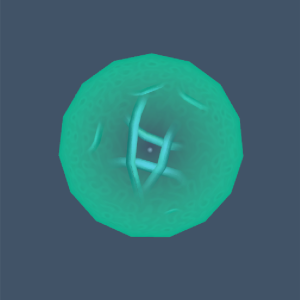Binding Agent: Difference between revisions
Filled out majority of page. Still some left to do |
mNo edit summary |
||
| (11 intermediate revisions by 4 users not shown) | |||
| Line 2: | Line 2: | ||
{{OrganelleInfoBox | {{OrganelleInfoBox | ||
| organelle = Binding Agent | | organelle = Binding Agent | ||
| icon = | | icon = BindingAgentIcon.png | ||
| image = | | image = BindingAgentOrganelle.png | ||
| image_caption = Close-up of a Binding Agent | |||
<noinclude> | |||
| image_caption = | |||
</noinclude> | |||
| cost = 55 | | cost = 55 | ||
| requiresNucleus = Yes | | requiresNucleus = Yes | ||
| Line 17: | Line 21: | ||
}} | }} | ||
Allows a cell to join others of its species to form a cell colony. Once bound in a colony, cells move as one and share compounds. Cells must unbind from a colony before entering the editor and dividing. | |||
Cell colonies are the first step towards multicellularity, so '''Binding Agents''' are vital for progressing to the next stage. | |||
== Requirements == | == Requirements == | ||
A cell must have a | A cell must have a '''[[Nucleus]]''' to evolve '''Binding Agents'''. | ||
If organelle upgrades are enabled in game settings, ''both'' of the following conditions must also be true ''for the player cell'': | |||
* Contains a '''[[Nucleus]]''' for at least '''5''' generations. | |||
* Has an '''ATP''' {{CompoundIcon|image=ATPIcon.png|internalName=atp}} balance of at least '''+15'''. | |||
== Processes == | == Processes == | ||
| Line 33: | Line 44: | ||
== Effects == | == Effects == | ||
Cells with '''Binding Agents''' (or colonies containing cells with '''Binding Agents''') may enter binding mode. While in binding mode, each cell consumes an extra '''+2''' '''ATP''' {{CompoundIcon|image=ATPIcon.png|internalName=atp}}. Binding mode deactivates on contact with a cell of the same species, joining the cells into a colony. Binding mode can also be deactivated manually. | |||
Cells in a colony | Cells in a colony share resources, dividing them equally between all cells. Colonies also benefit from reduced osmoregulation cost – each cell's osmoregulation cost reduces at a rate inversely proportional to the total number of colony members. | ||
== Upgrades == | == Upgrades == | ||
No | No upgrades. | ||
== Strategy == | == Strategy == | ||
The ability to form colonies is powerful, especially so for | The ability to form colonies is powerful, especially so for organisms using '''Photosynthesis'''. Every additional cell in a colony reduces overall osmoregulation cost, which means greater energy efficiency. Thus, photosynthetic species produce '''Glucose''' {{CompoundIcon|image=GlucoseIcon.png|internalName=glucose}} faster, and predatory colonies can survive longer between meals. | ||
Catching up with allied cells to bind with can be difficult however, so it may be fruitful to use a '''[[Signaling_Agent|Signaling Agent]]''' to call allies to your location. | |||
Cells can't divide while in a colony, so you must unbind before entering the editor. | |||
While a colony can grow indefinitely, you require only five cells to enter the next stage. Keep an eye out for the button to become multicellular above the editor button in the environment UI. | |||
== Scientific Background == | == Scientific Background == | ||
In multicellular eukaryotic organisms, individual cells are bound to one another by a variety of cell adhesion molecules (CAMs) located on the outer surfaces of their cell membranes. One major category of CAMs are transmembrane proteins (i.e. proteins that are embedded in the cell membrane and extend into both the interior and exterior of the cell) such as cadherins, which have extracellular extensions that can link up with those of cadherins belonging to other cells and thus bind their respective cells together. | |||
Latest revision as of 18:45, 18 December 2025
| Organelle Details | |
|---|---|
| Binding Agent | |

| |
| Base Cost (MP) | 55 |
| Requires Nucleus | Yes |
| Processes | None |
| Enzymes | None |
| Size (Hexes) | 1 |
| Osmoregulation Cost | 1 |
| Storage | 1 |
| Unique | Yes |
| Upgrades | None |
| Internal Name | bindingAgent |
Allows a cell to join others of its species to form a cell colony. Once bound in a colony, cells move as one and share compounds. Cells must unbind from a colony before entering the editor and dividing.
Cell colonies are the first step towards multicellularity, so Binding Agents are vital for progressing to the next stage.
Requirements
A cell must have a Nucleus to evolve Binding Agents.
If organelle upgrades are enabled in game settings, both of the following conditions must also be true for the player cell:
- Contains a Nucleus for at least 5 generations.
- Has an ATP
 balance of at least +15.
balance of at least +15.
Processes
No processes.
Modifications
No modifications.
Effects
Cells with Binding Agents (or colonies containing cells with Binding Agents) may enter binding mode. While in binding mode, each cell consumes an extra +2 ATP ![]() . Binding mode deactivates on contact with a cell of the same species, joining the cells into a colony. Binding mode can also be deactivated manually.
. Binding mode deactivates on contact with a cell of the same species, joining the cells into a colony. Binding mode can also be deactivated manually.
Cells in a colony share resources, dividing them equally between all cells. Colonies also benefit from reduced osmoregulation cost – each cell's osmoregulation cost reduces at a rate inversely proportional to the total number of colony members.
Upgrades
No upgrades.
Strategy
The ability to form colonies is powerful, especially so for organisms using Photosynthesis. Every additional cell in a colony reduces overall osmoregulation cost, which means greater energy efficiency. Thus, photosynthetic species produce Glucose ![]() faster, and predatory colonies can survive longer between meals.
faster, and predatory colonies can survive longer between meals.
Catching up with allied cells to bind with can be difficult however, so it may be fruitful to use a Signaling Agent to call allies to your location.
Cells can't divide while in a colony, so you must unbind before entering the editor.
While a colony can grow indefinitely, you require only five cells to enter the next stage. Keep an eye out for the button to become multicellular above the editor button in the environment UI.
Scientific Background
In multicellular eukaryotic organisms, individual cells are bound to one another by a variety of cell adhesion molecules (CAMs) located on the outer surfaces of their cell membranes. One major category of CAMs are transmembrane proteins (i.e. proteins that are embedded in the cell membrane and extend into both the interior and exterior of the cell) such as cadherins, which have extracellular extensions that can link up with those of cadherins belonging to other cells and thus bind their respective cells together.
